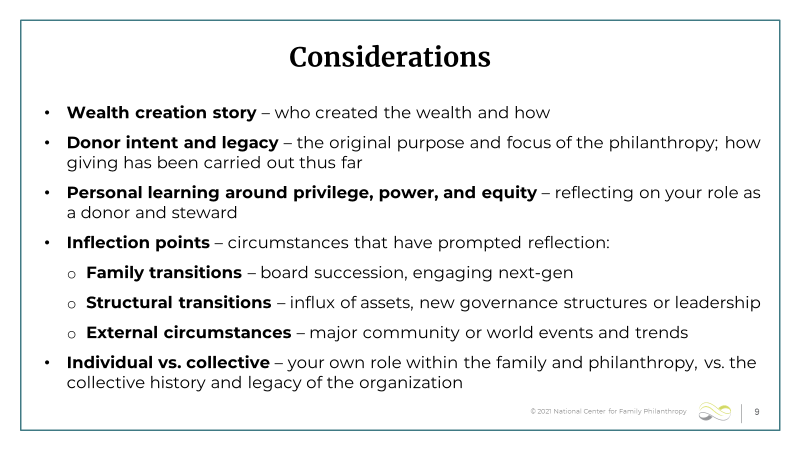Takeaways Blog on Reflecting on Your Origin Story

Courtesy of Suzy Hazelwood from Pexels
This blog summarizes key notes from our January Fundamentals of Family Philanthropy Webinar.
The criticism of wealth is longstanding and brings to the fore a conversation on justice that is important to reflect upon in the pursuit of effective family philanthropy. Though necessary, this type of reflection often raises a number of difficult questions that require philanthropic families to interrogate their histories and reconcile the actions of their ancestors. In the National Center for Family Philanthropy’s January 2022 webinar, Katherine Lorenz, Holley Fowler Martens, and David Roswell discussed how families successfully examine their histories to move forward with more equitable and just philanthropic efforts in the future.
The webinar explored three critical questions.
- What is an “origin story”, and why is it important for giving families to examine their histories and philanthropic purposes?
- How can families reflect on their legacies and the origins of their wealth? What are some strategies for learning about and discussing family history, wealth, and equity?
- How can these reflections be utilized to build a more effective and equitable philanthropic effort over time?
Below are important takeaways from the discussion.
There are several issues that every philanthropic family should consider when reflecting on their origin story.

Slide 9 from “Reflecting on Your Origin Story” presentation
Wealth creation story: It is important to reflect on both the positive and the negative aspects of your wealth creation story. Guilt, denial, and defensiveness are emotions that many families experience during this process. A key recommendation is to find a way to be able to sit with the mixed nature of your wealth creation story and honor all aspects of the origination story. It is important to divorce the responsibility for future action from the guilt that may be associated with the wealth creation. Reflecting on the mixed experience of both the positives and the negatives of your family’s wealth creation is an important process for philanthropic families.
Donor intent and legacy: In philanthropic families, future generations often have to grapple with the intent and legacy of the original donor. It can be complicated to feel proud of your family, love and respect your elders, and at the same time determine how to be productive in trying to right the wrongs that may have occurred during the accumulation of the original donor’s wealth. These are the mixed emotions that you may need to reconcile. There also may be disagreement among different generations about how to build on or interpret the original beliefs of the donor.
Personal learning around privilege, power, and equity: It is vital that philanthropic families engage in individual and collective learning to reflect on privilege, power, and equity in their philanthropic efforts. Many families have described the important journeys they have taken to learn more about systemic racism and white supremacy culture. A collective learning journey, where equity, decolonization, inclusion, and grantmaking are discussed can help families assess or re-assess both how they are funding organizations and who they are funding. Learning about the past, learning about the current situation and learning what you can do to make an impact going forward will help ensure that you move in the right direction. The learning journey can be where a lot of the change happens.
Inflection points: There are inflection points that create opportunities to reflect more deeply on your origin story. However, because these inflection points may be the result of a death or illness in the family, or some kind of familial conflict, they can be difficult. This makes it even more important to pause and take time to do the hard emotional work that needs to happen. Some inflection points are external and outside the control of the family, e.g., family philanthropy’s response to the COVID-19 pandemic. These ever-changing circumstances, internally and externally, may prompt a family to reconsider how they operate and examine how and why they give together.
Individual vs the Collective: It can be hard to reconcile the individual role each person has within philanthropy and the collective purpose of the family philanthropy. Family members often struggle with questions about when they can speak out freely as an individual and when they may need to be more cautious when representing the family. Sometimes you need to make trade-offs as an individual in order for the collective to work together effectively.
Regardless of how a family philanthropy reflects on their origin story, there are several best practices that were highlighted in the discussion to move families into action:
Explore your family history: ask questions and conduct research to better understand the origins of wealth. The more familiar you are with your family history, the easier it is to know how to move forward.
Embrace storytelling: reflect on your family history with intention and regularity.
Telling stories can help bring the past to life. This can be especially important for philanthropic families when key figures in the family have passed away. These stories will also help younger generations feel more connected to the family legacy. But it is important to not just focus on the positive, but to share the balanced story of up’s and down’s across a family’s history.
Communicate – internally and externally – with openness and honesty: do not hide the controversial components of your history.
It is important to balance approaching your origin story with humility, but also transparency. Sharing your origin story with grantees and potential grantees allows you to approach these organizations with integrity and humility. When philanthropic families have used this approach they often hear real appreciation from grantees for sharing the story of where their wealth came from.
Define the narrative: be thoughtful about creating your legacy
Defining the narrative entails being honest about the controversial aspects of your origin story, but also creating a legacy you can be proud of and including details on how you move the family giving forward and build on your origin story. You should be intentional about telling your story clearly. There may be a lot of data about your family giving in the public sphere, but the story needs to come from you.
Get assistance: hire an archivist, leverage consultants, or embrace staff to help you and your family define your narrative
Getting outside assistance can provide fresh eyes and fresh perspectives, and add neutral voices to potentially conflict-ridden conversations about the family’s origin story narrative. These outside voices can help philanthropic families ask themselves important questions that assist them with learning about their past, communicating their origin story, and developing their narrative about their future.
To learn more, the recording and transcript of “Reflecting on Your Origin Story: Understanding Wealth, Legacy, and Equity” are available exclusively to NCFP Friends of the Family and Partner Subscribers.
Daria Teutonico is a Program Director at NCFP
